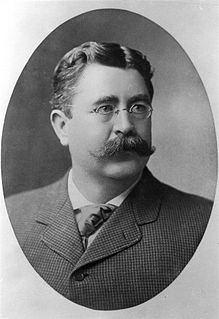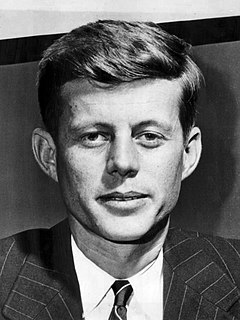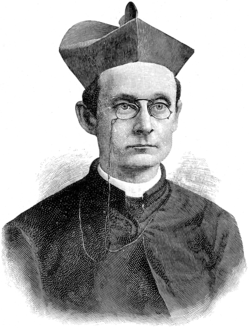
The Kennedy family is an American political family that has long been prominent in American politics, public service, entertainment, and business. The first Kennedy elected to public office was Patrick Joseph "P. J." Kennedy in 1884, 35 years after the family's arrival from Ireland. He served in the Massachusetts state legislature from 1884 to 1895. At least one Kennedy family member served in federal elective office in every year from 1947, when P. J. Kennedy's grandson, John F. Kennedy, became a member of Congress from Massachusetts, to 2011, when P. J. Kennedy's great-grandson, Patrick J. Kennedy, retired as a member of Congress from Rhode Island, a span of 64 years.

Boston College (BC) is a private Jesuit research university in Chestnut Hill, Massachusetts, founded in 1863. Although Boston College is classified as an R1 research university, it still uses the word "college" in its name to reflect its historical position as a small liberal arts college. The university has more than 9,300 full-time undergraduates and nearly 5,000 graduate students. Its main campus is a historic district and features some of the earliest examples of collegiate gothic architecture in North America.

Patrick Joseph Kennedy was an American businessman and politician from Boston, Massachusetts. He and his wife, Mary, were the parents of four children, including future U.S. Securities and Exchange Commission Chair and U.S. Ambassador to the United Kingdom Joseph P. Kennedy Sr. Their grandchildren through Joseph include U.S. President John F. Kennedy, U.S. Attorney General and U.S. Senator Robert F. Kennedy, and longtime U.S. Senator Ted Kennedy.
"A City upon a Hill" is a phrase derived from the teaching of Salt and Light in Jesus's Sermon on the Mount. In a modern context, it is used in United States politics to refer to America acting as a "beacon of hope" for the world.
Boston College Law School is the law school of Boston College. Boston College Law School is situated on a 40-acre (160,000 m2) wooded campus in Newton, Massachusetts, about 1.5 miles from the university's main campus in Chestnut Hill, Massachusetts.

Boston College High School is an all-male, Roman Catholic, Jesuit, college preparatory secondary school founded in 1863 with historical ties to Boston College. It serves grades 7-12 and is based in Dorchester of Boston, Massachusetts, United States. Its current endowment size is $84M.

Alumni Stadium is a football stadium located on the lower campus of Boston College in Chestnut Hill, Massachusetts, approximately 6 miles (9.7 km) west of downtown Boston. It is the home of the Boston College Eagles. Its present seating capacity is 44,500.

Richard James Cushing was an American prelate of the Roman Catholic Church. He served as Archbishop of Boston from 1944 to 1970 and was made a cardinal in 1958. Cushing's main role was as fundraiser and builder of new churches, schools, and institutions. Unlike his predecessor, he was on good terms with practically the entire Boston elite, as he softened the traditional confrontation between the Catholic Irish and the Protestant upper-class. He built useful relationships with Jews, Protestants, and institutions outside the usual Catholic community. He helped presidential candidate John F. Kennedy deflect fears of papal interference in American government if a Catholic became president.
The William F. Connell School of Nursing (CSON) is the professional nursing school at Boston College in Chestnut Hill, Massachusetts.

John Fitzgerald Kennedy, often referred to by his initials JFK, was an American politician who served as the 35th president of the United States from January 1961 until his assassination in November 1963. Kennedy served at the height of the Cold War, and the majority of his work as president concerned relations with the Soviet Union and Cuba. A Democrat, Kennedy represented Massachusetts in both houses of the U.S. Congress prior to becoming president.
The Boston College School of Theology and Ministry (STM) is the Roman Catholic (Jesuit) graduate theological school at Boston College in the Chestnut Hill and Brighton neighborhoods of Boston, Massachusetts. It is an ecclesiastical faculty of theology that trains men and women, both lay and religious, for scholarship and service, especially within the Roman Catholic Church.

Edward Joseph McCormack Jr. was Massachusetts Attorney General from 1959 through 1963.

The 1952 United States Senate election in Massachusetts was held on November 4, 1952. Incumbent Republican Henry Cabot Lodge Jr. lost to Congressman and future President John F. Kennedy, the Democratic Party nominee. This election marked the end of the Lodge family dynasty and the beginning of the Kennedy family dynasty.

What was originally called Harvard Colledge (around which Harvard University eventually grew) held its first Commencement in September 1642, when nine degrees were conferred. Today some 1700 undergraduate degrees, and 5000 advanced degrees from the university's various graduate and professional schools, are conferred each Commencement Day.

The Boston College–Holy Cross football rivalry is an American college football rivalry between the Boston College Eagles and Holy Cross Crusaders.

Morrissey College of Arts & Sciences (MCAS) is the oldest and largest constituent college of Boston College, situated on the university's main campus in Chestnut Hill, Massachusetts. Founded in 1863, it offers undergraduate and graduate programs in the humanities, social science, and natural sciences.
The University of Notre Dame's annual commencement exercises are held each May, currently in the Notre Dame Stadium. The exercises award undergraduate and graduate degrees.

Joseph Havens Richards, S.J. was an American Catholic priest and Jesuit who became a prominent president of Georgetown University, where he instituted major reforms and significantly increased the quality and stature of the university. Born to a prominent Ohio family, his father was an Episcopal priest who controversially converted to Catholicism, and had the infant Richards secretly baptized as a Catholic. Richards eventually entered the Society of Jesus.

Charles Henry Stonestreet, S.J. was an American Catholic priest and Jesuit who served in prominent religious and academic positions, including as provincial superior of the Jesuit Maryland Province and president of Georgetown University. He was born in Maryland and attended Georgetown University, where he co-founded the Philodemic Society. After entering the Society of Jesus and becoming a professor at Georgetown, he led St. John's Literary Institution and St. John the Evangelist Church in Frederick, Maryland. He was appointed president of Georgetown University in 1851, holding the office for two years, during which time he oversaw expansion of the university's library. The First Plenary Council of Baltimore was held at Georgetown during his tenure.













